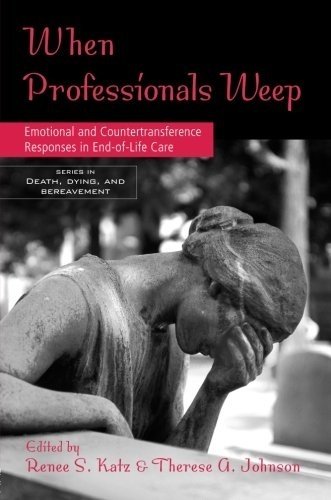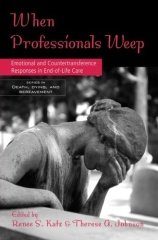
When Professionals Weep: Emotional and Countertransference Responses in End-of-Life Care
%25
1.382,94 TL
1.037,20 TL
Diverse leaders in the field of death, dying, and bereavement, address the issues surrounding the intersection of the personal and the professional in the unique context of end-of-life care.
End-of-life care (EOL) is a specialized area of work that crosses a number of academic and professional disciplines, including social work, counseling, hospice, physical medicine, geriatrics, nursing, counseling, psychology, and clerical work. Professionals who work in EOL have often had deeply moving personal experiences with trauma, death, and loss in their own lives, and almost inevitably bring their own histories, memories, notions, and assumptions to their work. These countertransference responses can be both complex and subtle.
Review:
'No health professional should fail to address the questions that arise within these pages, or to take heed of the dilemmas and solutions that are described here. I cannot recommend this book highly enough.' - Greta McGough, Nursing Standard
"Using end-of-life care as a broad tapestry upon which to work, the authors and their editors have woven together a sequence of chapters about health service and pastoral professionals who work with dying people and their families... They relate attention-riveting personal accounts of professional providers in end-of-life care settings whose experiences reveal countertransference as an ever present dynamic...Renee Katz and Therese Johnson not only have done a thorough job selecting exceptional authors from different settings but they themselves are also intimately part of the narratives both as solo chapter authors and as co-authors. The stories reveal examples of countertransference with personal poignancy, clarity, and practical resolutions for use...I gratefully acknowledge the editors and authors of When Professionals Weep for the increased level of personal awareness I have gained through reading their work. " - Shep Jeffreys, Death Studies
End-of-life care (EOL) is a specialized area of work that crosses a number of academic and professional disciplines, including social work, counseling, hospice, physical medicine, geriatrics, nursing, counseling, psychology, and clerical work. Professionals who work in EOL have often had deeply moving personal experiences with trauma, death, and loss in their own lives, and almost inevitably bring their own histories, memories, notions, and assumptions to their work. These countertransference responses can be both complex and subtle.
Review:
'No health professional should fail to address the questions that arise within these pages, or to take heed of the dilemmas and solutions that are described here. I cannot recommend this book highly enough.' - Greta McGough, Nursing Standard
"Using end-of-life care as a broad tapestry upon which to work, the authors and their editors have woven together a sequence of chapters about health service and pastoral professionals who work with dying people and their families... They relate attention-riveting personal accounts of professional providers in end-of-life care settings whose experiences reveal countertransference as an ever present dynamic...Renee Katz and Therese Johnson not only have done a thorough job selecting exceptional authors from different settings but they themselves are also intimately part of the narratives both as solo chapter authors and as co-authors. The stories reveal examples of countertransference with personal poignancy, clarity, and practical resolutions for use...I gratefully acknowledge the editors and authors of When Professionals Weep for the increased level of personal awareness I have gained through reading their work. " - Shep Jeffreys, Death Studies
"Katz and Johnson have made a major contribution to the field...The authors...represent a wide variety of professional backgrounds and specialty areas. The chapters range from theoretical to the deeply personal. ...Their attempt to go deeper into themselves and be honest with their personal countertransference experiences will help readers to reflect on their relationships. Using the excellent models to address countertransference in the end of life care...readers may well be able to avoid the experience of compassion fatigue." - Mary L.S. Vachon, Ph.D., Mortality
Bu ürüne ilk yorumu siz yapın!

